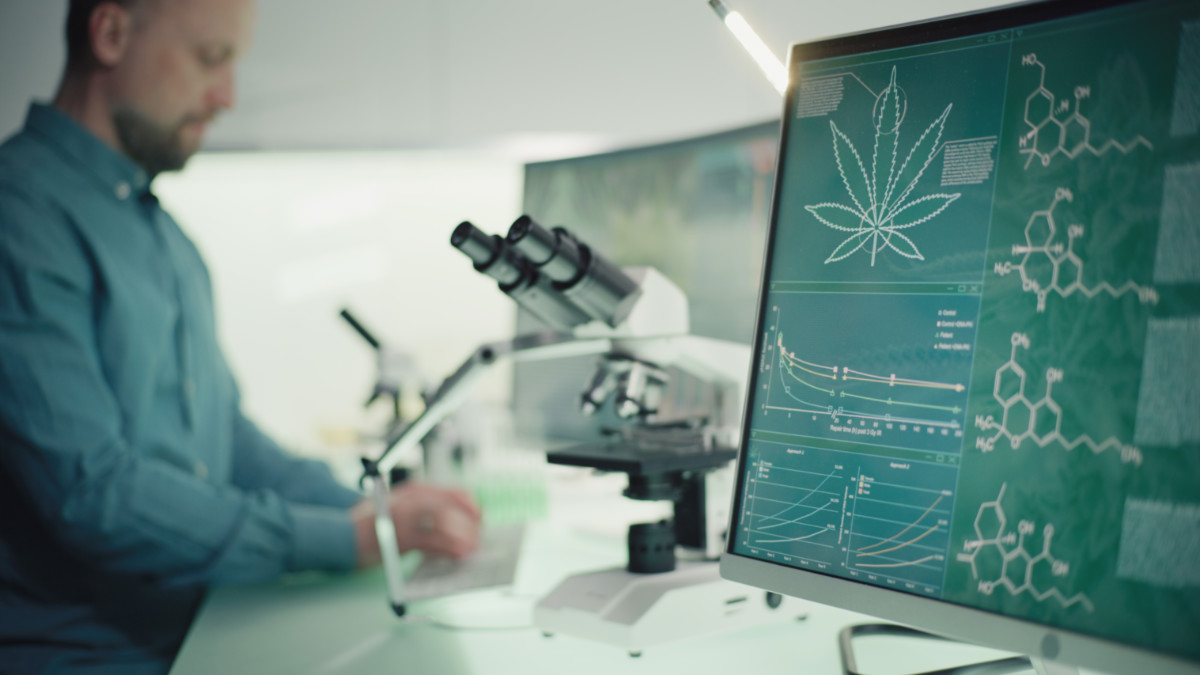Neurotech tackles the anguish of autism with low-THC cannabis treatment

Scientist working in lab. Testing medical marijuana buds, preparing medicine.
A medical dilemma in its own right – the modern treatment of the condition commonly known as ‘autism’ can come at a high cost and with debilitating side effects – something ASX-listed Neurotech International aims to change.
Developing a revolutionary therapy based on its own proprietary NTI164 cannabis strain, Neurotech International (ASX:NTI) is taking major strides in offering critical treatment alternatives for those with autism spectrum disorder and neuro-inflammatory conditions.
A full-plant extract, NTI164 is a patent-pending cannabis strain which differs from everything else on the market, containing rarer cannabinoids such as CBC, CBDP, CBDB, CBN and CBG, high CBDA, +4% Terpenes and less than 0.3% THC.
For all the non medical scientists at home, Stockhead asked Neurotech’s CEO Dr Alexandra Andrews to explain the approach – and the methodology – with fewer acronyms.
“NTI164 is a cannabis derived drug that contains lots of rarer, minor cannabinoids, which are not as common as your classic CBD but are extremely potent,” she said.
“Because it contains the properties from the whole plant, rather than just the THC or CBD extract from a plant, the components of it work together to create an entourage effect.
“What that means is that the product as a whole works more effectively than just the sum of its parts.”
“It’s a bit like if you had a bowl of chicken soup, but you only picked out the chicken pieces. You’d be missing out on all the other goodness.”
Like many cannabis-based treatments, the result is a more natural product with potentially less side effects than those commonly associated with synthetic drug alternatives.
An urgent, alternative need
NTI is making ground in demonstrating the efficacy of NTI164, with results of a Phase I/II autism spectrum disorder clinical trial imminent.
That trial was conducted at Monash Children’s Hospital with 20 patients aged from eight to 17 years old.
The results have the potential to be significant for those with autism, and the market need is urgent, given one in 44 kids in the US and one in 70 people in Australia are affected by autism.
The trial is the first to test full spectrum medicinal cannabis with less than 0.3% THC in the treatment of autism spectrum disorder.
That’s important, given current common treatments – including Risperidone, Ritalin and Concerta – leave a lot to be desired when it comes to side effects.
“The only US Food and Drug Administration (FDA) approved drug is Risperidone, and while that is a huge market it is a pretty undesirable drug to be on – especially long-term,” Dr Andrews said.
“Many kids that are on it experience side effects like weight gain, breast tissue development, nausea, digestive issues, anxiety – the list goes on.”
The Risperidone market is currently valued at US$5.6 billion, with projected growth through to 2030. Meanwhile, US annual sales of Ritalin and Concerta come in at US$2.1 billion.
“Ritalin’s got other side effects like nervousness, irritability and insomnia,” Dr Andrews said.
“What that means is kids and parents are often torn with the option of either sticking with the drugs and their nasty side effects or taking themselves off.
“This is why we believe it’s really important that there are better, more effective treatment options available for these kids – without the side effects as those currently on the market.
“What we’ve shown so far with NTI164 is that it’s very well tolerated, and kids haven’t experienced any of the serious side effects.”
With results from its Phase I/II study on the way, NTI is currently preparing towards a Phase II/III registration study with Monash.
The company’s management will soon head to Washington to meet with the US FDA and its regulatory advisors to ensure it is capturing the right details in its next clinical trial.
“We’ve had a huge influx of inquiries and requests from people looking to be part of the upcoming trial, which is encouraging to have such enthusiasm and interest from the public,” Dr Andrews said.
“From that we can see patients are interested and really keen to try something like this.”
Exploring anti-inflammatory properties
Beyond autism treatment, NTI is exploring the anti-inflammatory properties of its NTI164 cannabis strain.
Recent preclinical studies carried out in human neuronal cells demonstrated the strain, when combined with Diclofenac – the active ingredient found in Voltaren – significantly reduced and normalised the levels of key inflammatory biomarkers.
The company said Diclofenac on its own had a significantly lesser effect on the markers assessed – Tumour Necrosis Factor-alpha (TNF-alpha), COX-2 expression, Interleukin-6 (IL-6) and Interleukin-1A (IL-1A).
These biomarkers are associated with the onset and development of neuro-inflammatory disorders including Multiple Sclerosis and Alzheimer’s disease, as well as inflammatory auto-immune diseases like rheumatoid arthritis.
When combined with NTI164, Diclofenac’s effect was significantly enhanced – showing a 93% reduction in the expression of TNF-alpha, an 80% reduction in the expression of IL-6 and a 38-66% reduction in other key biomarkers.
“What we’ve been able to show preclinically is that our product is really anti-inflammatory in the brain,” Dr Andrews said.
“We’ve done some work in human neuronal cells, which has shown that it’s potent at reducing neuroinflammation, increasing mitochondrial activity and improving cell viability.
“That’s important, because it’s indicative if we can reduce neuroinflammation in this setting, we can, in theory, apply this drug to other conditions with neuro-inflammatory properties.
“Diseases like cerebral palsy, multiple sclerosis, Alzheimer’s – many diseases have this neuro-inflammatory component to them.”
This article was developed in collaboration with Neurotech International, a Stockhead advertiser at the time of publishing.
This article does not constitute financial product advice. You should consider obtaining independent advice before making any financial decisions.
Related Topics
UNLOCK INSIGHTS
Discover the untold stories of emerging ASX stocks.
Daily news and expert analysis, it's free to subscribe.
By proceeding, you confirm you understand that we handle personal information in accordance with our Privacy Policy.








